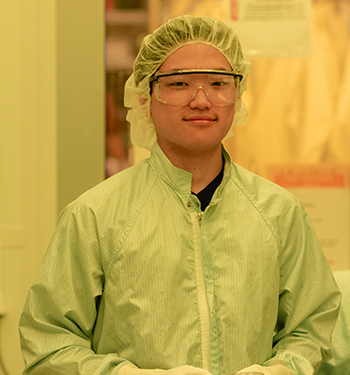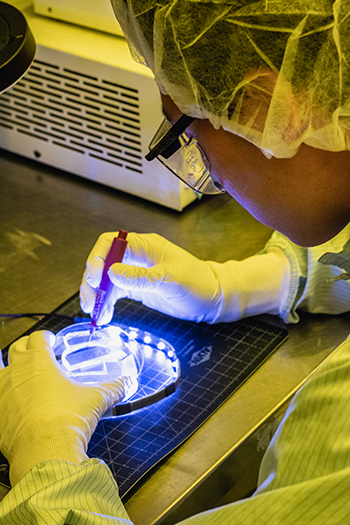 NAME: Benjamin Lee
NAME: Benjamin Lee
CONCENTRATION: Mechanical engineering
RESEARCH FOCUS: Microfluidics
RESEARCH LAB: David Weitz, Mallinckrodt Professor of Physics and Applied Physics
ADVISOR: Kirk Mutafopulos, Ph.D. candidate in applied physics
What have you been researching this summer?
This summer I have been working with microfluidic devices. I’m trying to build a device that can count cells at a moderately high speed. In industry, optics and lasers are currently used to count and characterize cells by fluorescence, but it requires more technical work since it uses high-powered lasers and a lot of different lenses. I am learning how to build new devices that introduce electric fields into a microfluidic channel that cells then flow through. The device is able to characterize a cell based on its resistance or capacitance, and also count the cells without needing to label cells before an experiment.
What are some of the practical applications of this research?
This research can be applied in the pharmaceutical industry and possibly in the food and agriculture industry. These chips would help to identify cell concentration based on an accurate cell counting mechanism or detect the presence of cells of interest within a presented sample. The vision is to make low-cost, disposable microfluidic chips that could rival existing methods of cell counting.
Why did you decide to pursue this area of research?
This research is very different from anything I’ve ever done before. I study mechanical engineering and I’ve worked in various product management roles. My mentor, Kirk Mutafopulos, who is a graduate student, introduced me to his research. I decided to pursue this research to get exposure to a completely different field than I’ve seen before so I could learn what is out there and develop new skills. I want to learn how to pick up new information because I don't have a strong biology or microfluidic background. To learn more, I’ve been reading papers and working with a biotech company called Cytonome. I'm here to learn a lot of new content and tackle challenging projects.
 What are some of the biggest challenges of conducting this research?
What are some of the biggest challenges of conducting this research?
Making the chip is really simple, but the limitations come from the equipment that is used to sense these cells. The work I'm doing is impedance sensing, but the electronic equipment you need to capture the impedance and/or the capacitance of a cell can actually be quite expensive. As of now, acquiring equipment and setting up the experiment is causing a lot of headaches and I’ve had to reach out to different retailers to see if they can lend us equipment and I’ve had to work with different labs to see if we can collaborate. The behavior of microfluidic flow in these devices can oftentimes go against intuition. I've hit a lot of initial roadblocks as I’ve just jumped into these projects at the end of May, and I can only read so many papers so fast, but I am learning a lot about these concepts and I am surrounded by great resources to find answers.
What do you enjoy about the research?
My favorite thing is the fact that the subject is entirely new to me and I get to work both in a research environment and an industry environment. I get to see the prototypes that we work on in the lab, but I also get to see the real-world applications of the research. I’m developing a sense of what can be manufactured in the real world, what researchers need from commercialized products, and exposure to existing products on the market. It’s also exciting that there is flexibility to move around. Overall, I enjoy that I can connect with a lot of different people, utilize a lot of great resources, learn how best to set up an experiment, talk with knowledgeable people, and develop more patience when working on newer topics.
Why has conducting research in a Harvard lab been a beneficial experience for you?
It’s really rewarding working in a Harvard lab because there are so many intelligent people here. I’m also impressed by the number of resources Prof. Weitz’ lab has. I’m grateful for the people and the access we have to the Center for Nanoscale Systems. People come from different universities over the summer to have access to some of the equipment here. Harvard carries a name so it inevitably attracts really smart people. I have the chance to work with these people and learn from them and it’s very exciting and humbling all at the same time.
What are your plans for after graduation?
I hope to work in the biotech industry for a little while. I’m really interested in perhaps a future in medical devices. I do see myself possibly coming back for graduate school, whether that is for a Ph.D. or an MBA, because I do want to learn more. But for the time being, I want to expose myself to industry to get some skills and figure out what I really want to be better at. Maybe I’ll try managing a business or focus on a certain part of the biotech industry and become an expert on that. That is my tentative plan, but I’ll see how it transforms over the years.